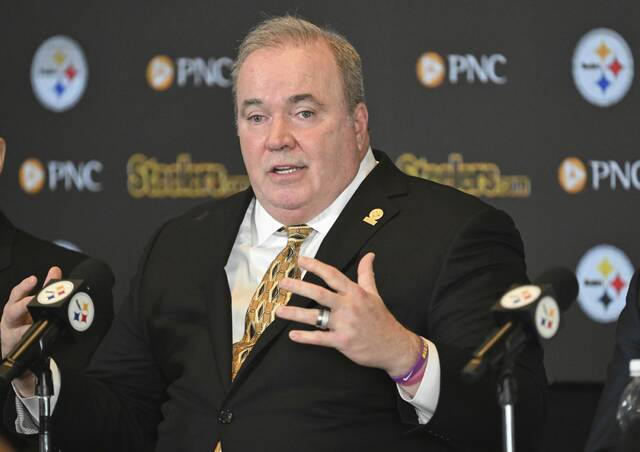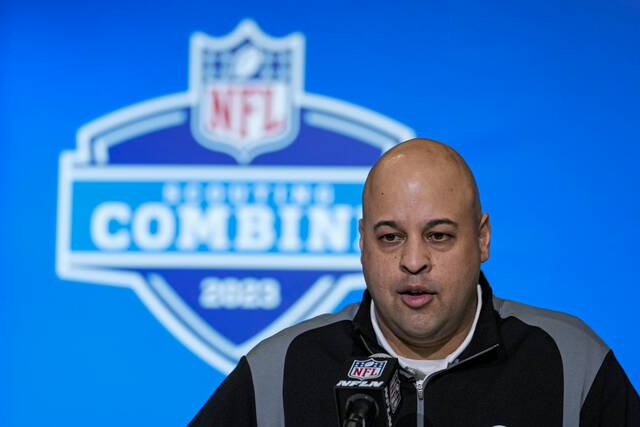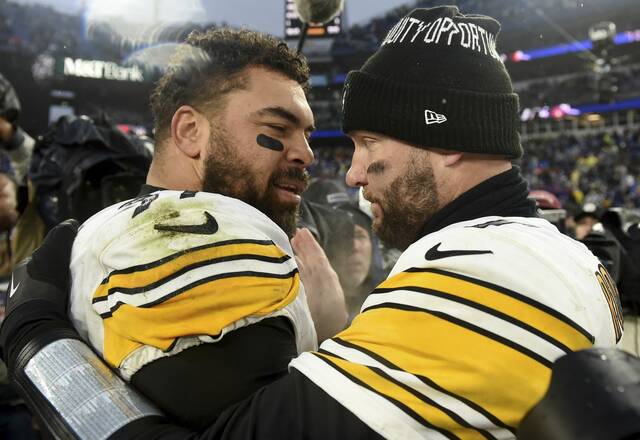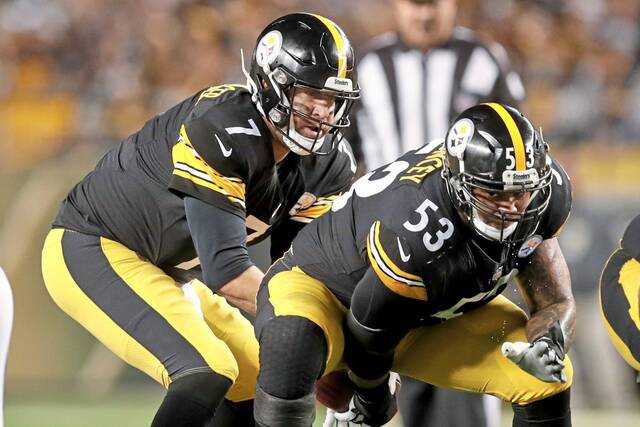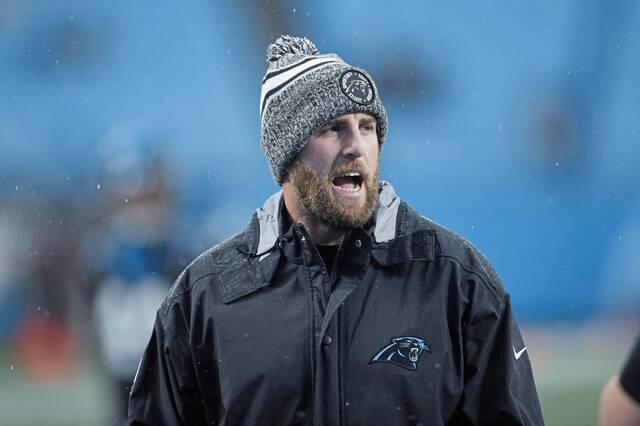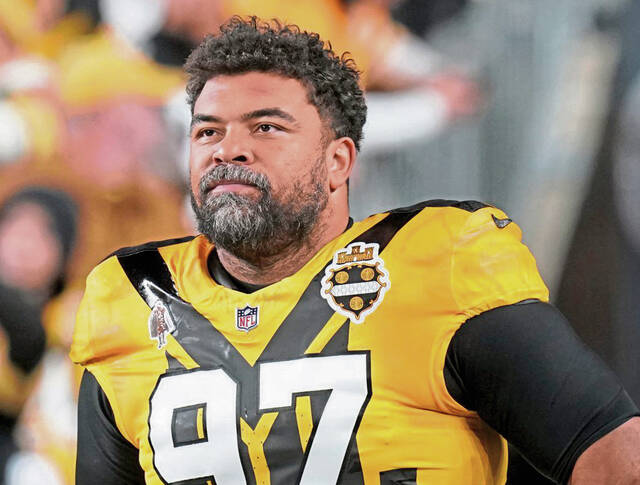Former Steelers coach Bill Cowher is releasing a new book on June 1 entitled “Heart and Steel” (Atria). It is co-written by Point Park graduate, New York Times bestselling author and Boston sports personality Michael Holley.
The memoir starts with Cowher’s life as a child growing up in Crafton and tracks through his current role as a CBS football analyst, his recent Hall of Fame election and the marriage to his second wife, Veronica Stigeler.
A lot of ground is covered. His playing days, his coaching path, his 15 years as Steelers head coach, his decision to retire, and some very poignant passages about his personal life, especially the death of his first wife Kaye.
But 270 pages weren’t enough to get all the details Steelers fans will surely want. So, in advance of the book’s release, Cowher joined me for Tuesday’s “Breakfast With Benz” podcast to talk about everything that is in the book.
And some things that aren’t.
What’s in the book: A lot about his first marriage with Kaye. Most notably, a look behind the curtain at her diagnosis of early onset Alzheimer’s and her battle with an aggressive form of melanoma. A fight that ultimately cost her life at age 54 in 2010.
The chapters in the book Cowher dedicates to this topic are by far the most compelling and revealing subject matter. I’m not writing that or mentioning it first because I think it’s “the right thing to say.” It’s just my opinion. And others I know who have been given advanced copies of the book have shared a similar thought.
“It’s more personal than I’ve ever been,” Cowher said during Tuesday’s podcast. “I opened myself up to the world. My hope is that my memoir can help in a small way to anyone who has traveled down a similar path of hardship.”
What stands out, in particular, are Cowher’s accounts of Kaye’s sad and rapid decline in health and his role of — at times — de facto in-home nurse.
During Kaye’s illness, the Cowher family was very guarded with details beyond the announcement that she was battling melanoma. In the book, Cowher and Holley go in-depth on how much of a struggle it was while she was sick and coping after her death. And the time dedicated to those years of Cowher’s life after retirement is well done and the most captivating in the book.
What’s not in the book: While Cowher goes deep when it comes to his family relationships, there isn’t a tremendous amount about individual relationships with players. His fondness for guys such as Rod Woodson, Jerome Bettis, Dermontti Dawson and Hines Ward is obvious. But it is largely on-the-field stuff.
I’m especially surprised at that there wasn’t more on his interactions behind the scenes with Kordell Stewart. The rise and fall — and ensuing resurrection and second fall — of Stewart, was such a dominant storyline for almost half of Cowher’s time here that I thought “Slash” might get his own chapter.
Or two.
But aside from some chronological game-related references, Stewart’s roller-coaster run in Pittsburgh doesn’t get as much ink as I expected.
What’s in the book: A sense that Cowher and New England Patriots coach Bill Belichick are a lot better friends than I ever thought.
Cowher tells a story about how the two established a connection when Belichick was a defensive assistant coach in New York with the Giants and he was on Marty Schottenheimer’s defensive staff in Kansas City. The two met at Giants Stadium, swapped experiences and used a lot of notes from each other in their respective roles.
What’s not in the book: Any connection between Spygate and the Patriots’ two wins over the Steelers in the 2001 and 2004 AFC Championship games.
There’s a ton about Troy Brown’s punt return in ’01 and Rodney Harrison’s pick-6 in ’04. But nothing on the sign-stealing controversy.
“It’s only cheating if you get caught,” Cowher told me during the podcast. “If he was able to get information on us, that’s not on him. That’s on us. We need to do a better job of hiding our signals. And making sure we didn’t give away something to the opponent. It’s called a competitive edge.
“I never got caught up in that. That wasn’t the reason we lost the game. We lost the game(s) because they executed better than we did.”
What’s in the book: A substantial amount regarding how his relationship with former director of football operations Tom Donahoe soured in the late 1990s.
“I couldn’t put my finger on what it was at the end of the ’98 season, going into ’99, but something was off in my relationship with our team’s personnel director, Tom Donahoe,” Cowher wrote.
“I don’t know if he believed I was trying to be more connected than he was in the office, but he was noticeably uncomfortable whenever I’d walk into Mr. (Dan) Rooney’s office. I’d go in for a routine check-in or to run a small item by him, but whenever I’d come out, Tom would want to know the sum of our conversations. It had never been that way before, but there was suddenly tension and eroding trust between us.”
What’s not in the book: His relationship with Chuck Noll during the time when Cowher took over for Noll in 1992.
The reason being, there wasn’t much of one to discuss.
That seemed to be intentional on Noll’s part. Cowher and Holley capture that well via two very descriptive memories Cowher shared.
“I don’t know if Chuck Noll was intentional with his exit plan after twenty-three seasons as Steelers head coach, but by the time I accepted the job in January 1992, Chuck’s office was cleared out. There was no sign he had ever been there,” Cowher wrote. “There wasn’t a master handbook — How to Be a Steelers Head Coach — to page through, and as scary and uncomfortable as that was, it was also the best thing for me. I was thirty-four, and I had my own opinions and tons to learn.
“I had to figure out how the building worked, what the dynamics were with the front office, the personnel and PR departments, and ownership. I needed to ask questions and get my own answers, not begin with any preconceived thoughts.”
Cowher also vividly recalled a very hands-off conversation between him and Noll on a plane prior to Cowher’s first season in 1992. An ecstatic Cowher was eager to pick the brain of his predecessor but got little enlightenment.
“I asked him about the work atmosphere of the office, and he answered, ‘It’s good.’ That was it. He didn’t explain or elaborate. It’s good. I asked him how he, as the head coach, navigated the personnel department and ownership. I asked about team doctors and the media, too. He gave all one-word or one-sentence answers. It’s good. Initially, I was taken aback by his minimalist approach. But the more I thought about it, the more sense it made.”
What’s in the book: Cowher’s decision to handle his exit after the 2006 season and Mike Tomlin’s arrival in a very similar way to how Noll handled things.
Because it worked before.
But Cowher does point out he left an Iron City beer in his office fridge for Tomlin as a welcome-to-town gift.
Tomlin eventually told Cowher he always kept it and never drank it.
If Tomlin didn’t crack that sucker open after watching the film of last year’s wild-card game, I assume he never will.
What’s not in the book: Extensive opinions of how he thinks Tomlin is doing now, or what their relationship is like today.
So during the podcast, I asked.
“I feel very good about my relationship with Mike,” Cowher replied. “I have so much respect for him. In a lot of ways what he did (in 2019) when Ben (Roethlisberger) was out was one of his best coaching jobs. And obviously what they did last year (to start 11-0) during the course of this pandemic. And all of the different protocols.”
Cowher does use a lot of space on the 1998-2000 playoff drought and how challenging that time was. I asked him if he sees the potential of Tomlin’s 2021 team snapping a similar rut of four straight seasons without a playoff victory.
“They are right where they need to be, with Ben coming back,” Cowher said. “The biggest question you are gonna have is along the offensive line to see if it can establish itself this year.”
Cowher also praised the Steelers draft. But he pointed to some variables such as the roster’s collective health during the year and the seeming improvement of the other teams in the AFC North.
What’s in the book: Lots of good insight about drafting and coaching quarterback Ben Roethlisberger during his stunning 2004 rookie season. Cowher talks at length about the push-and-pull that existed between Roethlisberger’s requests (and Cowher’s occasional temptations to acquiesce) to do more in the offense during that 15-1 regular season in ‘04, and the team’s desire to avoid overloading his responsibility.
Not to mention a tense exchange with incumbent quarterback Tommy Maddox after the Roethlisberger pick was made.
He also writes a lot about how Roethlisberger’s attitude and cockiness during the pre-draft interview process were jarring.
“The chip on his shoulder was impossible to miss,” Cowher writes. “He had an edge to him, and tremendous confidence that bordered on cockiness. Our general manager, Kevin Colbert, noticed it, too.
“We both decided we wanted to speak with him again in a few weeks. This time we flew him to Pittsburgh. I talked with him first, then pointed him toward Kevin’s office down the hall. After Ben left our building, Kevin and I compared notes.
“‘Well, what did you think?’ Kevin asked.
“‘Um, he was … better this time than he was in Indy?’ I answered with a laugh.”
However, Cowher frequently gushes about Ben’s ability on the field and pointed out how the QB was one of the first to contact him with congratulations about making the Hall of Fame.
What’s not in the book: The name Shawn Andrews.
That’s the Arkansas guard Cowher was allegedly ready to draft instead of Roethlisberger. As Steelers legend has it, late owner Dan Rooney eventually nudged Cowher and Colbert to take a risk on drafting a quarterback. That story doesn’t come up in the book, though. Instead, Cowher presents the choice as much more of a no-brainer — a collectively aligned front-office mindset and decision.
Come to think of it, if Andrews is drafted instead of Big Ben, is there even a book to write?
I suppose there could’ve been. But the last few chapters of Cowher’s coaching career probably wouldn’t have been as fun to relive.




